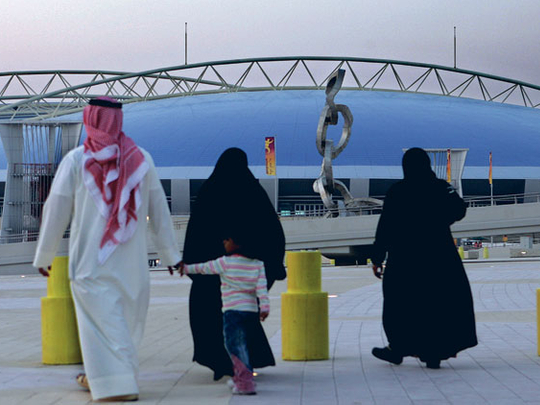
Manama: A young Qatari man needs up to one million riyals (Dh1,008,238) to get married in a society where wealth has become the only socially accepted symbol of status.
The problem is that although Qatar is immensely rich, with the income of its people reaching $100,000 (Dh360,000) per capita, not every Qatari can afford to pay the expenses of a typical marriage.
Particularly when weddings in the small, closely-knit Qatari community where traditions take precedence over personal preferences, are an extremely social affair, Qatari daily The Peninsula reported yesterday.
Bank loans
And even when a young Qatari who is not particularly wealthy somehow manages to marry by funding the occasion himself, usually through bank loans, his own savings or his family's help, he's sure to walk into a debt trap which comes with heavy financial burdens.
Several Qataris prefer to work for the government as opposed to the private sector, mainly because it guarantees them social security and soft, long-term housing loans that enable them to buy their dream home.
The society of Qatar is a conservative Islamic one and Islam forbids lavish spending on anything, including marriage, which is expected to be a simple affair.
However, traditions and a consumerist culture that took roots after the discovery of oil in the early 1950s, have transformed Qatar's social fabric.
The rush for riches has led to social values taking a back seat and the result is a highly competitive culture. The spirit of cooperation that was the hallmark of the tribal communities who used to inhabit the rough terrain of the Arabian Peninsula, is now often replaced by a spirit of unhealthy competition for wealth and a culture of showing off, the paper said.
Families today vie with one another in terms of material holdings. If a family has three Land Cruisers and Italian furniture, for instance, its neighbours would like to own four Land Cruisers and have the latest and even more expensive Italian décor.
Social study
Several Qatari sociologists, including Dr Ameenah Al Jaber, have studied these important social issues.
Growing consumerist culture has not spared even the key institution of marriage in Qatar and has made it so materialistic that for Qatari men in limited-income brackets, meeting the exorbitant expenses of a wedding remains the most challenging aspect of their life.
In the past, the government, as well as some charitable organisations, have tried to hold mass marriages for young Qataris to help them, but the experiment flopped miserably because in the consumerist Qatari community no family likes to admit openly that it is less financially able than the other.
"The innate spirit of competitiveness and one-upmanship in our community is mainly to blame for the failure of group marriages. People would like to be burdened for life with debt rather than get involved in anything that is even slightly suggestive that they're accepting charity and are at a lower social rung," a US-educated Qatari journalist told The Peninsula.
Marriage expenses start early on with the engagement. A Qatari man has to pay a dowry (called ‘Meher' in Islam, which a groom must give to his bride). In cash-rich Qatar, a man is expected to give to his would-be wife a dowry of 100,000 riyals on average, along with an engagement ring that can cost anything between 5,000 and 12,000 riyals.
A set of gold ornaments, studded with diamonds, is normally presented to the would-be bride and its cost ranges from 60,000 to 120,000 riyals.
Family gathering
The occasion has to be celebrated with at least a party for the women, where members of the two families gather. Some prefer to hold the gathering at home, while others book a hotel.
In any case, the average expense the man must bear is 80,000 riyals, according to local sources.
The man and the woman, though still officially unmarried, are allowed to see each other after the engagement, but not in private.
The idea is to allow them to get to know each other. Normally, the man visits the woman's home and they meet in the presence of a child.











